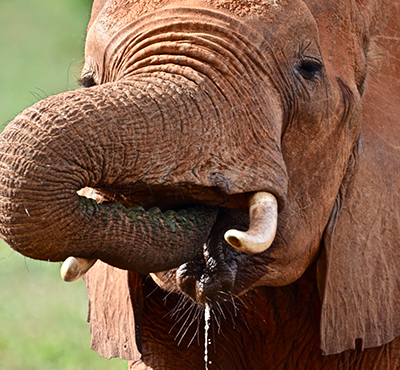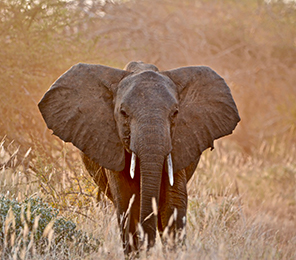.
Episode 7 with Dr. Bruce Schulte and Lynn Von Hagen
.
.
.

.
Resource List
- Von Hagen, R.L., Kasaine, S., Githiru, M., Amakobe, Mutwiwa, U., Schulte, B.A. 2019, "The impacts of conflict and the search for solutions in the Kasigau Wildlife Corridor, Kenya." Journal of Elephant Managers Association
- Hoffmeier-Karimi & Schulte. 2017, “Assessing Perceived and Documented Crop Damage in a Tansanian Village Impacted by Human-Elephant Concflict.” Pachyderm
- Von Hagen, R.L. 2018. "An Evaluation of Deterrent Methods Utilized to Prevent Crop Raiding by African Elephants (Loxodonta Africana) in the Kasigau Wildlife Corridor, Kenya". WKU TopScholar
- Chiyo et al. 2012, “The Influence of Life History Milestones and Association Networks on Crop-Raiding Behavior in Male African Elephants.” PLoS ONE
- Ihwagi et al. 2012, "Rainfall pattern and nutrient content influences on African elephants’ debarking behaviour in Samburu and Buffalo Spring National Reserves, Kenya." African Journal of Ecology
.
SCIENTIST BIOGRAPHY
.
Bruce Schulte, Ph.D,
Associate Vice-President for Strategy, Performance and Accountability, Western Kentucky University
Dr. Bruce A. Schulte is the Associate Vice-President for Strategy, Performance and Accountability at Western Kentucky University. He also is a University Distinguished Professor and he was the Department Head of Biology from 2009-2019. Bruce is studying human livelihoods, biodiversity, elephant behavior, and ecosystem functions in the Tsavo ecosystem in Kenya, in partnership with Wildlife Works. His efforts are helping to conserve the region and ensure that humans and wildlife maintain a mutually beneficial, sustainable relationship.

Lynn Von Hagen
Ph.D. Student, Auburn University
Lynn Von Hagen is currently a Presidential Research Fellow and PhD student researcher at Auburn University. She has been with the Earthwatch project Elephants and Sustainable Agriculture in Kenya since it’s first year and helps to lead field teams and conduct research. She is a non-traditional student and a proud advocate for women in STEM and returning students. She received her BSc from Austin Peay State University and then went on to join the Earthwatch project in conjunction with her Master’s of science degree from Western Kentucky University. She is continuing her PhD work on the project through Auburn University and is focusing on applying the previous findings from the project and incorporating them into workshop programs to benefit the community as well as monitoring elephant movements and applying behavioral theory to conservation management; all with the goal of promoting human elephant coexistence.
.
.

.
Look good while doing good!
.
.
FEATURED EXPEDITION
.
Elephants and Sustainable Agriculture in Kenya
Help local farmers to conserve elephants and their habitat in southeast Kenya by implementing sustainable agriculture practices.
Africa: Kasigau Corridor, Kenya (between Tsavo East and West National Parks), Kenya, Africa
Lead Scientist: Bruce A. Schulte, Ph.D.
Duration: 12+ days (avg. $250 a day)
.
YOUR SUPPORT MATTERS
Earthwatch depends on donations—above and beyond what we raise from volunteers who participate on our expeditions—in order to deliver our global conservation mission. In fact, volunteer contributions provide only half of the total resources Earthwatch needs to sustain over 40 field research expeditions, a wide variety of educational programs, corporate sustainability trainings, and more each year.
